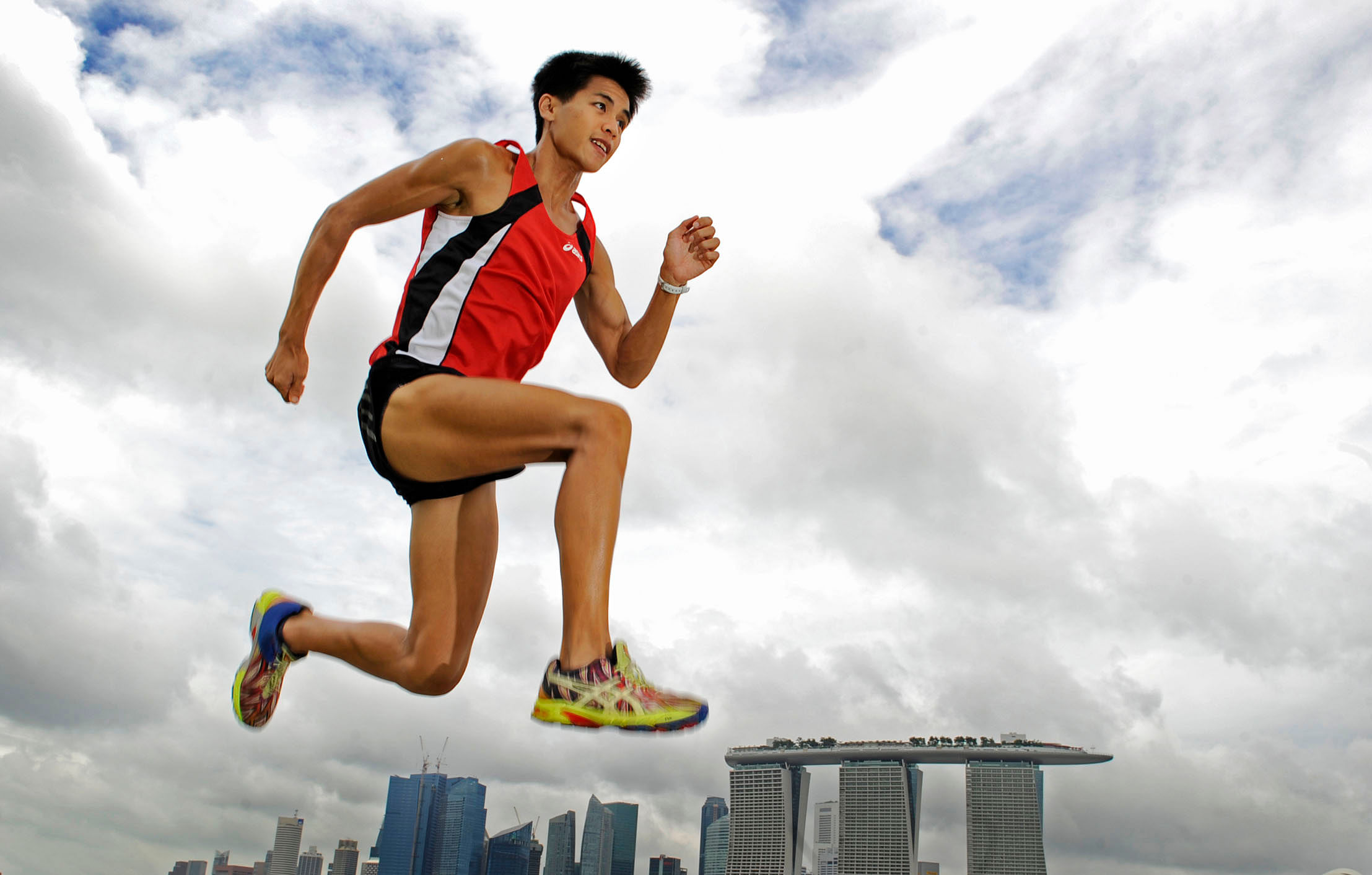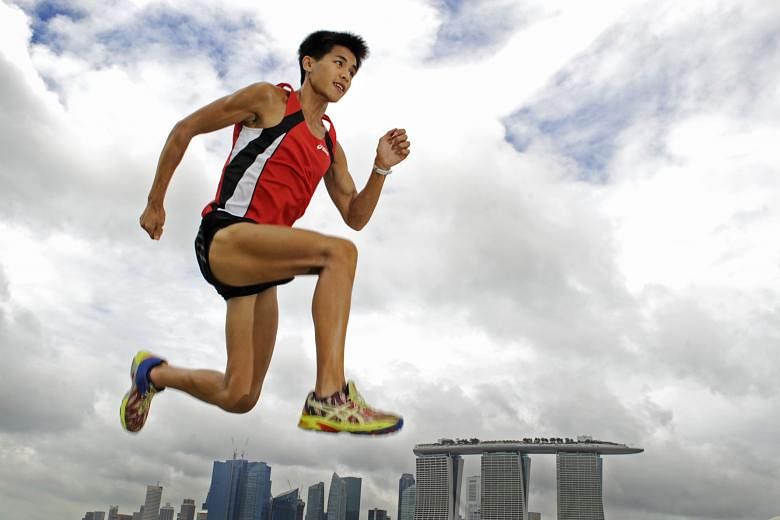In the early morning dark of tomorrow, a doctor of chiropractic will slowly begin the chase of his fastest self. He will rise at 2am, slather on lubricant, slip on shoes and visualise in the silence. Bread and peanut butter will be eaten. Dynamic warm-up will be done. Prayer will be quietly uttered.
He ran 15km on Monday, 10 on Tuesday, 15 on Wednesday, 11 on Thursday. Some days he's sore, tired, but always he runs because he knows with a devoted man's clarity why he runs: "To fulfil all the potential I've been blessed with."
That's his goal, this is his long-term target: 2:19, which might get him to the Olympics; 2:19, which is 13 minutes faster than he's ever been; 2:19, which he probably won't get tomorrow at the Standard Chartered Singapore Marathon but he'll chase it every week and month and year like a holy cause.
The runner is Ashley Liew, second at the 2015 New Orleans Rock'n'Roll Marathon, who will not be taking selfies en route or posting pictures of himself grinning in a Finisher T-shirt. He's not here for fun but to be fast and as close as possible to first. He's also a member of a tiny, barely-known Singapore sporting society: the elite runner.
Singapore is a city on the soleful move - 12,500 runners in the marathon alone tomorrow - but only few glide at a rapid pace. The city has parks, roads and weekly runs but recreation is the primary pursuit, not records: The goodie bag for some is more attractive than a proper gallop in the sun. But as Soh Rui Yong, two-time SEA Games marathon champion says: "High-performance runners don't care about all that, we just want to race."

Mass participation is a sign of a healthy awakening and inspiring proof of sneakered interest, but it has not yet translated into a wider, competitive ambition. Liew looks at his fingers and counts: Maybe eight elite male runners in Singapore, he guesses, and five women.
That makes 13, which is probably the number of long-distance world-class medals won by a single Kenyan village. We don't have those genes, long limbs or hills to build our lungs. Instead we have a sticky heat, says Mok Ying Ren, the 2013 SEA Games marathon champ and 2007 triathlon winner, "that isn't conducive to outdoor sports". Parents, he adds, see swimming as a "gentler sport" and a fine skill to own on an island. Running, everyone knows. Yes, but running fast is something else.
Running, for all its flourishing numbers here, isn't yet as acutely competitive as in Japan and South Korea, whose men and women have together won 11 Olympic marathon medals and where admiring crowds stand deep along the route. In Singapore, when Liew's girlfriend came to support him for the start of the Army half-marathon in August, she earned "funny looks" for she was the only one on Esplanade Bridge.
Japan, for instance, is the land of shoe engineers, running researchers and the Hakone Ekiden, a long-distance collegiate road relay over two days which is almost a century old. "They have an entire industry behind them," says Ben Tan, 50, sports medicine specialist and dedicated marathoner.
In this year's Tokyo Marathon there were 13 Japanese men in the top 25 who were under 2hr 14min and in the Seoul Marathon seven Koreans in the top 20 were under 2:20. Singapore's national record is 2:24:22, set in 1995 by Murugiah Rameshon, who this week said he was "surprised" it still stood. It is not that our few elite runners are absent of talent, but they lack a deep field to push each other, for it is only from hard, daily competition that seconds fall away with the sweat.
Long-distance running is a test for Singaporeans but it is not as physically out of reach as NBA basketball. We're lean, strong and meditative and there's a potential here, agrees Tan, that hasn't been fully realised. The heat can't be fixed but we can tinker with our approach: To our fiesta of mostly fun runs, let's bring a varnish of professionalism.
Runners here sometimes start together, a mismatched herd of walkers, joggers, first-timers, middle-aged PB chasers, which means elite athletes must thread through the field like pickpockets in a crowd, losing time with every swerve.
So forget the VIPs, let's send the fast runners off first always. Let's signal that we respect talent. Let's not have runners at start lines for 50 minutes, but dispatch them with Japanese precision instead. "If a race there is supposed to start at 6.57am," says Soh, "then, bang, it starts at 6.57."
Some runs aren't even measured to an accurate distance: 10k can be 9.5k, or 10.5k, which means you're faster than you think or slower than you boasted. Mok shrugs down the phone line and says he's used to it. As they must be to race markers - to signify 30km are up, for instance - which are unclear or at the wrong place. For racers who break their runs into specific time chunks, this can cause mathematical mayhem.
To be fast is to be fastidious. And so narrow paths and uncertain marshals do nothing for momentum. To be swift is to be a stickler. And so to find a designated water station has miraculously sailed to another spot plays hell with hydration.
The smallest thing in a long race is consequential. One time a runner was confronted with water cups only one-third full and felt physically depleted. At other times "water" and "sports drinks" weren't clearly marked which led to Tan and Liew mistakenly bathing themselves with sticky sweet stuff. Cool-downs turn into hot temper.
-
SINGAPORE ON THE ROAD
-
NUMBER OF RUNS IN SINGAPORE THIS YEAR:
Over 100, according to running website JustRunLah!
SINGAPORE MARATHONERS AT THE LAST FIVE ASIAN GAMES: 0
SINGAPORE MARATHONERS AT THE OLYMPIC GAMES:
Yvonne Danson (1996),
Neo Jie Shi (2016).
SINGAPORE MARATHONERS AT THE SEA GAMES
• First SEA Games marathon winner: K. Jayamani (1983).
• First SEA Games male marathon winner: Mok Ying Ren (2013).
• First back-to-back winner: Soh Rui Yong (2015 and 2017).
SINGAPORE MEN'S MARATHON NATIONAL RECORD:
2hr 24min 22sec (Murugiah Rameshon, 1995 SEA Games)
SEA GAMES RECORD: 2:20:27 (Indonesia's Eduardus Nabunome, 1997 SEA Games)
SINGAPORE WOMEN'S MARATHON NATIONAL RECORD: 2:34:41 (Yvonne Danson, 1995 SEA Games)
SEA GAMES RECORD: 2:34:29 (Indonesia's Ruwiyati, 1995 SEA Games)
But why should we care about this, why cater to a small tribe?
Because to call it a Run is also to race; because professionalism is not just proper signage, it's a larger attitude towards sport which becomes the underpinning of a strong culture; because runners who are committed to be the best of us deserve the precision to find their best; because the faster they go, the more we appreciate what we can do as a people; because the deeds of the heroic help cement a culture.
Developing elite runners will require parental approval, official enthusiasm and science, but also an environment which encourages them. As lesser runners we should feel privileged to be in faster company and thankful that the great democracy of road-running allows commoners to compete on the same road, on the same day, as champions. Organisers here sometimes say a run is a people's race but it must embrace all people. The slow but also the fast.
Tomorrow Liew, 30, the marathoner, will drive to the race with an older man, Andrew, who is the 10km defending champion in the 65-69 age category. At some point they will shake hands and separate and then father and son will run into the darkness. Both of them deserving of the right conditions to chase their early morning dreams.


